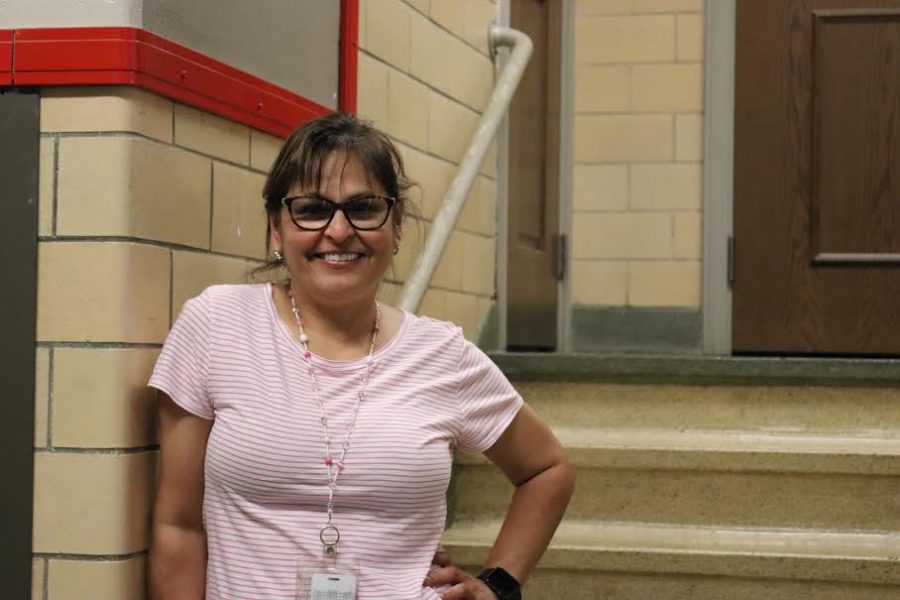Teacher Appreciation: Mrs. McTaggart
LH: What is your name?
M: My legal name is Maria Velina McTaggart, but I like to go by my middle name, which is Velina.
LH: What do you teach?
M: I teach ELL high intermediate 2 and low intermediate. The low intermediate is the next level after you have had beginners for about two years. Then you have other levels before you reach the Advanced Level.
LH: Can you explain what ELL is?
M: ELL is short for English Language Learners. This is a program that uses English as the instructional language for eligible students. It teaches students to achieve English proficiency and academic mastery of subject matter content and higher order skills including critical thinking. The intent of the program is to provide literacy skills that can be transferred to English language acquisition and have the ELL students apply what they have learned into their classrooms.
LH: Have you always wanted to be a teacher?
M: Yes, I have always wanted to be a teacher. I was in 3rd grade when I wanted to be a teacher. I was a very shy student. I loved seeing teachers teach students but in 5th grade, a teacher embarrassed me when I didn’t respond to her question. She ridiculed me and that’s when I told myself that I would become the best teacher I could possibly be. I remember thinking in my mind I am NOT going to be like her. I will praise students and encourage them to be the best that they can be. So I was very determined to be a teacher! I have 32 years of experience.
LH: Is this what you expected your career to look like?
M: Like I said, I have been teaching close to 32 years and I’ve taught grades 1-12. I’ve taught in private schools, self-contained, bilingual, dual language and gifted & intelligent. I’ve taught many different areas of teaching. By far the most enjoyable career or section is here at City High. I love the atmosphere! I love the kids! I have built strong relationships with many of my students to where they invite me to their soccer games and baptisms. The kids feel very secure and comfortable in coming to me for homework help or other problems that they are facing.
LH: What is the most exciting part about your job or most enjoyable part of your job?
M: I have a lot of fun teaching ELL kids. I like to put humor into my lessons and when I see them laugh or see that twinkle in their eyes that they understood the [lesson], by far that is the best thing ever!
LH: What is the hardest part of your job/career?
M: Sometimes, the hardest part of the classroom is when one student distracts or interrupts your lesson. It is hard to get everyone’s attention back.
LH: Do you think teaching would be as fun if you taught a subject besides ELL?
M: I have taught many different content areas and grades. I have challenged students and have encouraged them to focus on goals for their future.
Aside from teaching ELL, I had fun teaching gifted and talented students in Texas. I had to be like five steps ahead of these students. I enjoyed challenging these kids. This was also a great experience for me.
The biggest pleasure for me is to see the face of a student who finally understands a concept. I do [teach] ELL, and I also do success center. Success center is like a study hall. Students come and work on any subject matter they have. I am there to guide them and sometimes provide one-on-one teaching. Sometimes, some of that subject matter is extremely difficult, especially when you haven’t taught it for so many years.
LH: What is the difference between the hardship of the normal kids at City High experience than the ELL students?
M: One of the main differences between the ELL kids and regular kids is that the ELL students do not entirely understand and/or comprehend all the English concepts taught in a regular class. The ELL students need many accommodations such as providing closed captions when viewing movies, or reducing the number of questions on the test and so on. Learning a new language such as English takes time and practice and that’s what ELL kids need.
The ELL students come from homes where a language other than English is spoken. It is important to differentiate instruction because some states use the terms to define different instruction for different students.





















